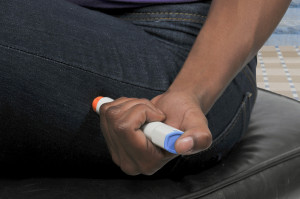
Anaphylaxis is a severe allergic reaction which is usually triggered by foods, drugs, an insect sting, or latex. Anaphylaxis symptoms progress quickly and can be fatal if left untreated.
The early symptoms may be mild, including itchy eyes, a rash, or a runny nose. These symptoms can quickly lead to more serious problems like:
-
- Facial swelling
- Trouble breathing
- Tightness of the throat
- Nausea
- Abdominal pain
- Vomiting
- Diarrhea
- Fainting
- Cardiac arrest
The first line of defense in combating severe allergic reaction is epinephrine.
What Is Epinephrine?
Epinephrine is a naturally occurring substance in the body, more commonly known as adrenaline. It’s a classic “fight or flight” hormone produced by the adrenal glands in response to stress. This hormone plays a crucial role in the contraction and relaxation of muscles and in a person’s feelings of energy, fear, and awareness.
How Epinephrine Stops Allergic Reactions
Epinephrine produces multiple functions by binding to different receptors of cells in the body. For severe allergic reactions which lead to hypotension, epinephrine helps to increase blood flow through veins by constricting blood vessels.
By binding to receptors on smooth muscles of the lungs, epinephrine helps to relax the muscles blocking the airways and allows breathing to return to normal. More importantly, epinephrine binds to specific receptors on the immune cells which helps to suppress further chemical release (histamine) that is responsible for allergic reactions.
Automatic Injection Devices
Automatic injections of epinephrine for allergic reactions comes in different brands such as EpiPen and Auvi-Q. Ask your doctor or pharmacist to show you and any of your caregivers who may need to inject the medication how to use an automatic injection device. Before using epinephrine, read the accompanying patient information, which includes step-by-step instructions for injection.
Administering Epinephrine
Epinephrine for allergic reactions should be injected into the middle of the outer thigh. In an emergency, epinephrine can be injected through clothing if necessary. Do not administer epinephrine to any other part of the body, including:
- Buttocks
- Fingers
- Hands
- Feet
- Arm
A second dose of epinephrine should be injected if the initial anaphylaxis symptoms do not improve after 10 minutes of the first treatment.
Side Effects of Epinephrine
Several expected side effects of epinephrine include:
- Fast or “pounding” heartbeat
- Sweating
- Headache
- Weakness
- Shakiness
- Paleness
- Dizziness
- Feelings of nervousness and anxiety
Things to Keep in Mind
Due to the severity of anaphylaxis, it is critical that people with serious allergies keep their epinephrine injection device with them or accessible at all times. Epinephrine for allergic reactions should be injected as soon as you suspect you may be experiencing anaphylaxis symptoms.
Experts agree that epinephrine should be used as the first line of defense in treating anaphylaxis, even if a patient’s reaction fails to meet all the established criteria.
After injecting a dose of epinephrine, some solution will remain in the injection device. This is normal and does not mean that you did not receive the full dose. Take the used device with you to the emergency room or ask your doctor or pharmacist how to dispose of used injection devices safely.
While epinephrine helps treat serious allergic reactions, it does not take the place of professional medical treatment. Call an ambulance or go to the hospital immediately following an epinephrine injection.
Expert Allergy Treatment Specialists in Houston, TX
Severe allergies are more than an inconvenience – they can be life-threatening. If you believe you have an undiagnosed allergy, it is crucial you make an appointment to get tested.
Allergy & ENT Associates provide specialized care for the diagnosis and management of all types of allergies for patients throughout the greater Houston area such as Clear Lake, Katy, Kingwood, and many more. We employ a team of experienced doctors and support staff who will find a treatment plan that works for you.
Book your appointment online or by calling (713) MY-SINUS today!



